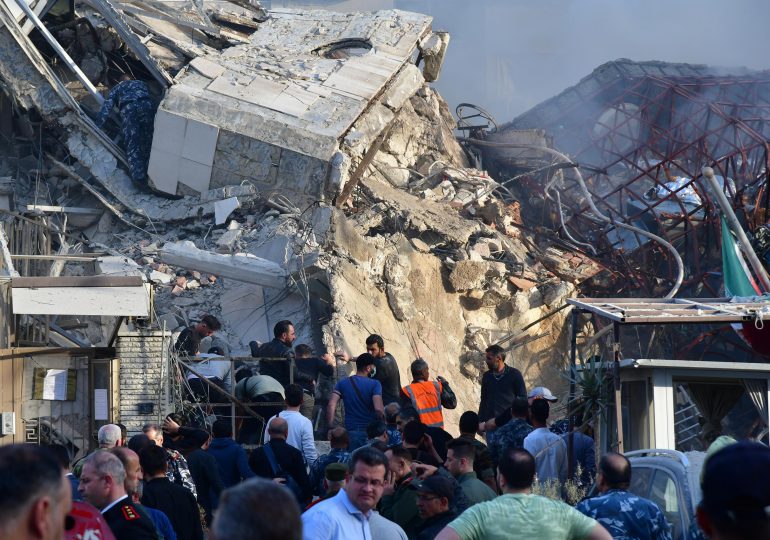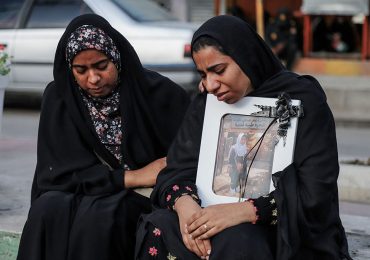IRAN could launch a terrifying October 7 style revenge attack in Israel before hitting “targets” in the UK, experts have warned.
The chilling reaction comes after Israel is believed to have blasted a consulate in Syria, killing seven including a top Tehran general, as Iranian leader Ebrahim Rasi promised a stern response.
The horrific aftermath of the Iranian embassy building in Syria’s capital after it was thought to have been destroyed by Israeli airstrikes
Dr Alan Mendoza spoke to The Sun and warned people in the UK and all of Iran’s enemies to stay ‘vigilant’ as they prepare to get revenge
IRGCOne of Iran’s top generals Mohammad Reza Zahedi was killed in the blast that could spark a global conflict[/caption]
Many have grown increasingly concerned that Iran – who has constantly backed and supported terrorist groups like Hezbollah and the Houthis – could spark a global war with Israel over the airstrike.
Any form of escalation could not only cause the Middle East to plunge into a deeper crisis but also lead to a global response.
Russia, China and North Korea could become embroiled in the fighting as Iranian proxies and global terror groups could exploit the attacks to cause damage to the West.
Dr Alan Mendoza – executive director of think tank Henry Jackson Society – called on the enemies of Iran to stay “vigilant” as the world waits to see their response.
IRAN’S REACTION
Mendoza is all but certain that Iran will seek their revenge on Israel for the deadly strike in the Syrian capital Damascus.
It comes after Ebrahim Rasi vowed it “will not go unanswered” before labelling it a “cowardly crime“.
He was quick to point the finger of blame at Israel – something many are in agreement with.
Dr Mendoza called on the world to “take the Iranian warning seriously”.
It could be a series of global targets. It could be at attempt to strike Israel again in an October 7, style war – this time with Lebanon
Dr Alan Mendoza
He told The Sun: “They’ve laid down their marker so we can only assume they’re going to do it but it could be much longer plan to say ‘we are thinking about this and we are strategising our next step’.
“It could be a series of global targets. It could be at attempt to strike Israel again in an October 7, style war – this time with Lebanon.
“There are many options the Iranians could employ and the obvious options would be to use Hezbollah to create more pressure on Israel and to take out some targets.
“Or they could look to other proxies in the Houthis in Yemen who have been firing missiles towards Israel and also groups in Iraq who have been trying to fire missiles.
“The other option that Iran has not been shy to use in the past has of course been external global terrorism against Israeli or even Jewish targets.”
The history of Israel and Iran’s relationship
THERE’S been an ongoing conflict between Israel (left) and Iran (right).
In 1947, Iran was among 13 countries that voted against the United Nations Partition Plan for the British Mandate of Palestine.
Two years later, Iran also voted against Israel’s admission to the United Nations.
After the 1979 Islamic Revolution, Iran severed all diplomatic and commercial ties with Israel, and its theocratic government does not recognize the legitimacy of Israel as a state.
The turn from cold peace to open hostility began in the early 1990s, shortly after the collapse of the Soviet Union and the defeat of Iraq in the Gulf War, after which relative power in the Middle East shifted to Iran and Israel.
CONFLICT ‘HEATS UP’
The conflict escalated in the early 1990s, as Yitzhak Rabin’s government adopted a more aggressive posture on Iran.
Rhetorical conflict heated up during the presidency of Mahmoud Ahmadinejad, who made inflammatory statements against Israel.
Other factors that have contributed to the escalation of bilateral tensions include Iran’s development of nuclear technology relative to Israel’s long-stated Begin Doctrine, Iran’s funding of Islamist groups such as Hezbollah, Palestinian Islamic Jihad and Hamas, as well as alleged involvement in terrorist attacks such as the 1992 attack on Israeli embassy in Buenos Aires and the 1994 AMIA bombing, and Israel’s alleged support for militant groups such as the People’s Mujahedin of Iran and Jundallah as well as alleged covert Israeli operations in Iran including multiple assassinations and bombings.
‘COMPLEX AND ONGOING’
Since 1985, Iran and Israel have been engaged in an ongoing proxy conflict that has greatly affected the geopolitics of the Middle East, and has included direct military confrontations between Iranian and Israeli organizations, such as in the 2006 Lebanon War.
The conflict has played out in various ways, including through support for opposing factions in conflicts in Syria and Yemen.
Iran has provided support to the Syrian government, while Israel has supported opposition groups.
In Yemen, Iran has provided support to the Houthi rebels, while Israel has provided support to the Saudi-led coalition fighting the rebels.
The conflict has also involved cyber attacks and sabotage against each other’s infrastructure, including attacks on nuclear facilities and oil tankers.
Overall, the Iran-Israel proxy conflict is a complex and ongoing conflict that has had a significant impact on the political and security dynamics of the Middle East.
INSIDE THE WAR
In the Israeli–Lebanese conflict, Iran has supported Lebanese Shia militias, most notably Hezbollah. In the Israeli-Palestinian conflict, Iran has backed Palestinian groups such as Hamas.
Israel has supported Iranian rebels, such as the People’s Mujahedin of Iran, conducted airstrikes against Iranian allies in Syria and assassinated Iranian nuclear scientists. In 2018 Israeli forces directly attacked Iranian forces in Syria.
Iranian Islamists have long championed the Palestinian people, whom they perceive as “oppressed”.
Scholars believe that by supporting the Palestinians, Iran seeks greater acceptance among Sunnis and Arabs, both of whom dominate the Middle East.
Ideologically, Iran seeks to replace Israel with a one-state solution and has predicted Israel’s demise. Israel sees Iran as an existential threat, and accuses its regime of harboring genocidal intentions.
Consequently, Israel has sought sanctions and military action against Iran to stop it from acquiring nuclear weapons.
MIDDLE EASTERN CRISIS
Iran could be set to unleash many of their proxies as a fierce response – including the feared Hezbollah and Houthi fighters.
This could bring an already battered area in the Middle East to breaking point as it teeters on a knife-edge.
Israel are still stuck in a fierce conflict against their Hamas foes and are facing opposition globally for their plan to eliminate every last Hamas fighter.
It comes as Israeli Prime Minister Benjamin Netanyahu admitted an “unintentional” airstrike last night killed six aid workers including three Brits.
The workers and their Palestinian driver were killed while travelling in a deconflicted zone, charity World Central Kitchen said.
Shocking footage showed the victims’ bodies at a hospital in the central Gaza town of Deir al-Balah and their bloodied passports among the debris.
This has only caused further arguments against Israels continued domination of Gaza globally.
But as Iran get dragged deeper into a war they could create their own bloody chaos for Israel through their controlled cronies.
Hezbollah has already been an active instigator in recent middle eastern conflicts through numerous planned attacks.
And the Houthis have been a constant issue for Israel, the US and UK as they continue to attack shipping vessels in comradery with their fellow thugs in Hamas.
The Iranians like to operate at arm’s length. They don’t like to directly get the hands dirty
Major General Rupert Jones
Mendoza is now most fearful of a damning regional conflict taking over the Middle East as nations battle for superiority.
He said the initial attack and Iran’s promise to retaliate will only “increase the major risk of a regional conflict breaking out”.
Mendoza continued: “Iran has already pledged its response and it’s likely to increase the demand that Hezbollah responds.
“There has already been increased volatility on the Israel Lebanon border and there is a lot of talk in Israel that they have to go north and resolve the threat of Hezbollah in the same way that Hamas has been dealt with.
The burnt-out wreckage of a World Central Kitchen’s car after Israel admitted an ‘unintentional’ airstrike killed six aid workers
AFPFears over a global escalation of war have grown as the Iran and Israel conflict in the Middle East could soon spill over to the Western powers[/caption]
Iran could use proxies such as the Houthis (pictured) and Hezbollah to cause chaos in the Middle East
“So if you join the dots you can see if Hezbollah ramps up it’s side and Israel ramps up it’s side then before you know it you end up with a full scale war on the Lebanese Israeli border.
“This could then perhaps bring in others afterwards and this could be the starting point of a larger escalation.”
Major General Rupert Jones also spoke on how Iran likes to avoid “getting their hands dirty” by using outside forces to create tension.
He told The Sun: “The Iranians like to operate at arm’s length. They don’t like to directly get the hands dirty.
“They like to operate through proxies but there has to be consequences for Iran when when they do this.
“They like to act and think it’s with impunity but people eventually eventually will hit back at them as the Israelis have done in this instance.”
The Sun’s Defence Editor’s analysis of the Middle East tinderbox
By Jerome Starkey, The Sun’s Defence Editor
FEARS that the Middle East could explode into all-out war are ratcheting up today after Iran vowed vengeance for a deadly Israeli missile strike on its embassy in Damascus, the capital of Syria.
At least 11 people were killed when a consular annex was reduced to rubble by strikes which Iran says were carried out by Israeli F-35 fighter jets.
Now among those 11 killed were two top Iranian generals, Brigadier Mohammed Reza Zahidi, who we understand commanded Iran’s Revolutionary Guard in Syria and neighbouring Iraq, and Brigadier Mohammed Haji Rahimi.
Also among the dead is a representative of the Hezbollah terrorist group Hussein Yusuf.
Both Iran and Hezbollah have vowed vengeance, with Iran’s president Ebrahim Raisi saying this strike will not go unanswered.
The suggestion is that perhaps Israel has crossed a threshold with a strike on an embassy.
Embassies are sovereign soil of the nations they belong to, so this was a strike on sovereign Iranian soil in Syria and in one sense it is an escalation and the concerns that this could spiral out are in many ways well founded.
Interestingly today we’ve heard reports in the local media in Syria and in the region that America appears to be distancing itself from this strike, officials saying they had no advanced knowledge.
It would appear that the reason for this missile strike was the meeting between these Revolutionary Guard commanders and the representatives of Hezbollah.
We will now have to wait and see how Iran chooses to take its revenge.
Now of course, if you are an Israeli diplomat living abroad, then you may well think that you are now more of a target.
Because Israel has targeted an Iranian embassy, we may expect to see the possibility that Itan may target Israeli diplomats or missions around the world.
And we have just seen, in the last few days suspected Iranian agents attacking an Iranian journalist here in London.
Tehran is showing, perhaps by this stabbing that it maintains the ability and the capability to attack people it sees as critical of the regime enemies of the regime around the world.
Some context that we understand that Tehran employs criminal proxies to carry out that sort of dirty work doesn’t necessarily have the same sort of sophisticated overseas operations that we might expect of other hostile actors like Russia.
But nonetheless, I think in the wake of what happened in Damascus on Monday, combined with what’s been happening across the region in recent months, there is concern and anxiety to see how Iran responds and what that will elicit from Israel.
WW3 FEARS
Israel’s airstrike isn’t the first time Iran has faced the wrath of a global power as the US has previously hit back at them for using global terrorists.
As Iran and Israel continue to fight it out through tit-for-tat offensives on one another the larger and more looming issue lies when one of the two cross the red line outside of the Middle East.
Mendoza feared that soon enough Western powers might be forced to step in to solve the “Iranian problem”.
He described the potential of other countries being drawn in to the conflict as “inevitable”.
Before blaming Iran for “throwing their weight around, intervening in its neighbours affairs and supporting and promoting terrorism”.
WHO COULD BE INVOLVED?
Despite saying only “a very unusual chain of events” will cause a global war any time soon, Mendoza was still wary of who could intervene.
He said: “The US has already sent strong messages to Iran and Hezbollah saying ‘don’t you dare’ escalate [the fighting].
“So the reality is if there were to be a significant escalation that could be easily traced to Iran there is a possibility that the Americans could get involved and punish Iran for its continued bad behaviour internationally.
“That could in itself prompt other countries to get involved as well.”
Naming Russia, China and North Korea as the potential pals to Iran in a new World War, the executive director was quick to note who to be wary of.
“Could other countries try to support Iran in some ways? Yes it is possible,” he said.
“China could covertly do that or Russia could covertly do that.
“North Korea, we already know the access they have working to supply Russia with drones and other activities in Ukraine so we know that these relationships exist.
“So there is definitely the potential for a conflict that goes beyond the region.”
Mendoza was also quick to call on the people of the UK to “be vigilant” to any potential threats of a looming WW3.
Saying: “We should all be aware of this problem and be aware that Iran has assets in the UK and beyond that it might seek to activate them.
“Therefore vigilance is the order of the day for all of Iran’s enemies right now.”
Hezbollah are thought to be the biggest and most powerful non-state military force in the world
ReutersIsrael is still heavily embroiled in their war with Hamas as Gaza continues to be destroyed[/caption]
Leave a comment








